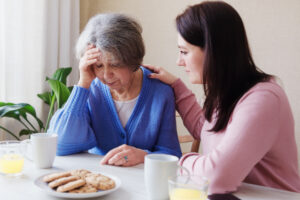Please help us continue to support over 1,277 Cambridgeshire families living with dementia.

“She tries to write things down to help her remember things. But it just ends up with lots of notes all over the house and she can’t really understand what note is in reference to what.”
Lucy (30) has always been close to her mum, Joyce, who is now in her seventies. Joyce developed Alzheimer’s disease around four years ago, so today their relationship has changed, but it is still very close. For Lucy one of the most difficult things has been the emotional effect of losing the person her mum used to be.
“It was like grieving for someone that you’ve not lost,” explains Lucy, “and I couldn’t really talk to mum about it properly because she could see I was upset and getting worried. So, she’d try and reassure me and tell me not to worry, but she couldn’t comprehend what I was worried about, and she didn’t understand.
“She was losing her memory. And it was such a scary and sad time because I knew I was losing her, but I also have this one person that I would normally talk to about everything, and I couldn’t talk to her because she couldn’t understand.
“There is such a thing as grief, when someone hasn’t died.”
Although Lucy’s dad is determined to try to support his wife, he has his own challenging health problems, so Lucy tries to care for them both, but without stepping on toes. She works part-time but has changed to a zero-hours contract to be more flexible for caring for her mum. This however puts more financial pressure on her partner.
Lucy worries about her parents’ ability to cope and struggles to get the right support for them both, which is stressful and time-consuming. But thankfully there is the lighter side! Joyce is still the happy, caring person she always was. She still loves art and dancing and although she can’t go to events alone, Lucy plans trips and takes her out and about.
“The most emotional thing,” reflects Lucy, “is when she forgets who I am occasionally, and the first time she forgot my birthday, because normally she’d be so good at birthdays and things. She may forget who I am, but she always knows that I’m someone that she can trust and cares about. She’ll say things like, ‘oh, you’re a really good friend’, or ‘you’re a really good sister’.”
But Lucy and her mum are not alone. We are right there with them, supporting them both.
Lucy attends one of our Hubs, regular support groups for carers.
“When I first went,” she explains, “I felt a bit of a fraud because I don’t live with my parents. I thought, I’m not really a carer. But since being there, I’ve discovered that nobody feels like they’re really a carer. And you soon realise that actually all the struggles that other people have had, you’ve had too, and you can share things with each other.
“It’s a safe place to let stuff out.”
In addition, Lucy has used our counselling service and registered for our What If? Plan.
“Counselling made me realise, actually, I do need boundaries and I do need to look after myself.”
Please help us continue to support Cambridgeshire families like Lucy and Joyce’s


